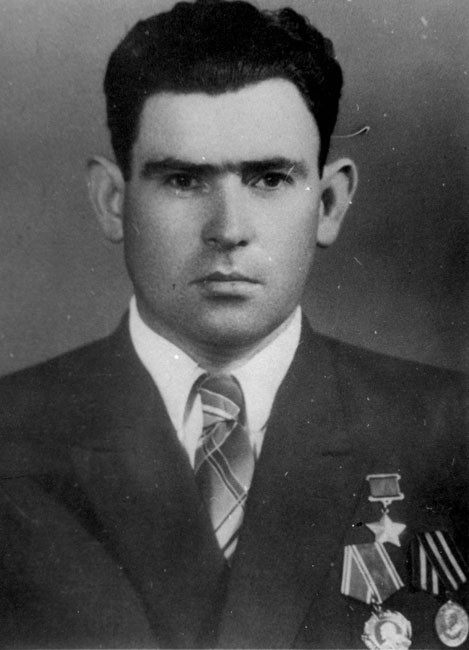Iakov (Iasha) Forzun was born in 1924 in Korostyshev, Ukraine. After graduating from school in 1939, Forzun moved with his mother to Zhitomir, where he worked as a tinsmith. After the outbreak of war between Soviet Union and Nazi Germany on June 22, 1941, Forzun and his mother managed to evacuate to Russia's Penza District, where he worked as a tractor driver on a collective farm (kolkhoz). In August 1942 Iakov Forzun was drafted into the Red Army. After several months of study at the Chapaevsk Infantry School, he was sent to the Briansk Front. He served as a machine-gunner, participating in the battles for Stalingrad and Kursk and was seriously wounded twice. On June 22, 1944 the Red Army launched Operation Bagration (June, 22 - August 19, 1944) for the liberation of Belorussia and eastern Poland. On June 24 as a machine gunner at the Infantry Regiment Forzun participated in an attack on the German front lines north of Vitebsk. Along with several others soldiers Iakov volunteered to be among the first to cross the West Dvina River and to seize a bridgehead on its left bank. After crossing the river undiscovered and reaching the enemy rear, Forzun and his comrades opened fire as a signal to the rest of the troops to cross also the river. However, the next day the Germans launched a deadly offensive, killing the members of his group except for Forzun who, along with several other Red Army soldiers who had joined him, repulsed 11 German attacks, killing several hundred Germans before being united with the rest of the battalion's troops. On July 22, 1944 Forzun was awarded the title of Hero of the Soviet Union for courage displayed during the West Dvina crossing. Forzun was informed about this while recovering in hospital after having been seriously wounded. In a video interview given in 2012 Forzun recalled this moment, stressing that at that time being awarded this medal had a special meaning for him as a Jew:
"… a meeting [in his honor] was held in the hospital hall and all the patients were gathered there. The head of the hospital took [the letter] and read it out before all those gathered; it stated that I had been awarded the title of Hero of the Soviet Union. … Then he told me to deliver a speech. So I delivered a speech, saying that [during the war] I fought … [in many battles], I was the first to cross the West Dvina, holding [there] the defense line... here [in the hospital], all of us [the wounded soldiers] are lying in the same room but some … keep saying that the Jews don't fight. However, I can tell you that I am a Jew and I have deserved the title of Hero of the Soviet Union. I fought well and all the [other] Jews are fighting well. … When I said this, the doctors and the nurses… began to cry… [since] many of these doctors…and the medical personnel were Jews…."
In January 1945 the article “Machine-gunner Iakov Forzun Killed 40 Hitlerites in One Battle. He Was Awarded with Title of Hero of the Soviet Union," by Major Aron Toker, was prepared by the Jewish Anti-Fascist Committee for the Jewish press in the West. In early February Iakov Forzun arrived in Moscow to receive the Hero of the Soviet Union medal. While in Moscow he visited the Jewish Anti-Fascist Committee office and met with its leaders.
In 1946 after demobilization Forzun worked as a foreman in Zhitomir. In 1990 Iakov Forzun immigrated with his family to Israel, where he is now living in the city of Or Akiva.
Leyb Kvitko about Iakov Forzun
On February 8, 1945 the article "A Son of His People" by Leyb Kvitko was published in the Jewish Anti-Fascist Committee's Yiddish newspaper Eynikayt. At the beginning of his essay Kvitko wrote:
"One day a Motl peysi dem khazans (the hero of Sholem Aleichem's Motl, Peysi the Cantor's Son) dropped in at our office at the Jewish Anti-fascist Committee.
When we greeted him, his childlike, half-downcast glance radiated joy, as if [to indicate that] we should move aside. Indeed, our people … seemed to enter along with this lad and fill all the space. In real life, not in literature, his name is Iasha Korzun, the son of Tsali the cobbler from Korostyshev, and he is a Hero of the Soviet Union, with an Order of Lenin and one of The Golden Star, both of which he received in the Kremlin from the trustworthy hands of [President] Kalinin.
This hero is 20 years old although he stresses that he is almost 21…"
From: Leyb Kvitko, "A kid fun folk" (A Son of His People), Eynikayt, February 8, 1945.
Aron Toker about Iakov Forzun
An excerpt from an article by Major Aron Toker "The machine-gunner Iakov Forzun" from December 7, 1944 prepared for the Jewish Anti-Fascist Committee (JAC) relates Forzun's bravery during the crossing of the West Dvina:
" … On June 24, 1944 during the crossing [by Soviet troops] of the West Dvina River, [Iakov Forzun] was the first in his [machine-gunner] company [of the 199th Guard Regiment] to cross the river on a raft [with machine guns and ammunition]. After crossing to the other bank of the river, he immediately opened fire from his machine-gun at the enemy [positions], [thus] covering the crossing by our other units. During the night of June 25, when the German … heavy infantry troops, assisted by artillery and tanks, carried out fierce counterattacks, despite heavy enemy's fire comrade Forzun successfully repulsed these counterattacks. When the gun-loader was put out of commission, comrade Forzun took a machine-gun and continued to repulse the counterattacks of the Germans. In this battle comrade Forzun beat back 11 enemy counterattacks and remained at the bridgehead until the arrival of reinforcements, killing over 40 German soldiers and officers. …"
From: GARF 8114-1-149, copy YVA JM/26137.







